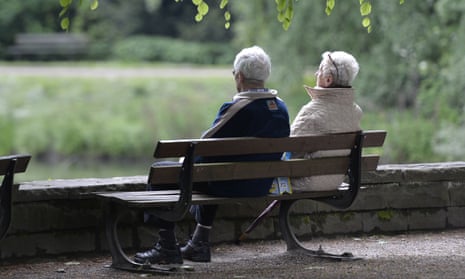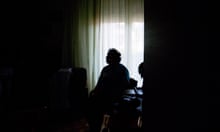It is the age of rebellion. They may be frail, but 95-year-olds engage in miniature campaigns of “resistance and subversion” to foster a sense of control over their lives, a study has confirmed.
From refusing to wear emergency call buttons to casting aside walking sticks, many members of a cohort born in 1921 studied by health scientists at the Universities of York and Newcastle used “subversive tactics to maintain a level of independence”, often laced with humour and secrecy aimed at their offspring.
The group of 23 95-year-olds living in Newcastle upon Tyne were largely happy, and the most important factor in sustaining a positive attitude to life was a sense of independence, sometimes achieved by refusing to take paracetamol when asked, denying having “a fall” but admitting to “a slide”, or hiding an emergency buzzer.
“Being independent came through strongly as a way of explaining their continued passion for life and was strongly equated to feelings of dignity and youth,” said Prof Joy Adamson, from the University of York’s Department of Health Sciences. “A bit of risk-taking, particularly with their health, was also important in order to keep their autonomy, particularly with family, where children had now become the carer.”
The study comes as the latest census results show there are 527,900 people in England and Wales aged 90 and over – up 23% in a decade.
In interviews with researchers, Margaret, 95, said: “I don’t wear [a call button], no. No, I haven’t got anything like that. I seem to remember having one at one time. Maybe I have put it away [laughter].
“People are surprised that I don’t need support. I go up the stairs and down. It’s like climbing Mount Everest going up [laughter] but I don’t want a stairlift at all.”
Pauline, who was “vexed” with her granddaughter for suggesting she should move into a care home, refused to use her call button when she fell.
“I told the doctor: ‘I don’t fall.’ He said: ‘Well, what do you call it?’ I said: ‘A slide.’ I don’t even hurt myself. I just slide down … It was funny, the last fall I had … The doctor up there said: ‘Well, we’re trying to put you in a home.’ I said: ‘Don’t you dare.’”
The researchers discovered that reliance on others was sometimes considered frustrating, and the 95-year-olds took steps to “regain some element of control and exercise ‘resistance’ within a potentially unequal power dynamic”. Mary, for example, told the chemist not to deliver her medicine to her home using the excuse: “I never know when I’m gonna be in.”
“I’d rather go up for them myself,” she said. “So I get them on a Friday, when I get some ham and some rolls.”
Alan lived in assisted housing, had carer support twice daily and meals delivered but still considered himself independent.
“I get up and I make my own bed, get dressed,” he said. “I don’t do bad for my age. So I’ve still got my independence. Which is good, because along with independence comes dignity.”
Adamson said: “Striving for independence sometimes meant risk-taking, even in ill health, where some participants resisted care, such as wearing emergency buzzers, because they considered the risk of a potential injury or becoming unwell in the home to be preferable to not having authority over their own lives.
after newsletter promotion
“This was an important finding because it makes us rethink how the oldest in society view safety and risk. These can be at odds with those who provide informal or formal care. Although devices such as emergency buzzers have their benefits, the question is: at what cost to the older person in terms of anxiety and upset about a loss of autonomy? Should we be looking to achieve a greater balance between surviving and ‘thriving’?”
She said: “While there were some frustrations and tensions around feelings of loss of autonomy and independence, small acts of resistance and subversion were acted out in order to maintain some sense of control.”
A dominant theme among participants – who were all young adults at the outbreak of the second world war – was that they had had, and continued to live, an enjoyable life and were content in what they had achieved.
“Lovely,” said Eileen. “I enjoy every day”
Jean said she felt “very lucky in what I’ve spent my life on”.
“I’m the oldest lady member of the golf club,” she said. “At the annual dos, I’m sitting at the top table with the captain. Very often, I’m presented with the flowers there … It’s really a wonderful life. I’ve had a great life but I’ve worked hard … I’ve been busy but it hasn’t done me any harm.”









